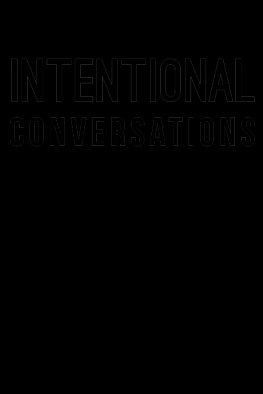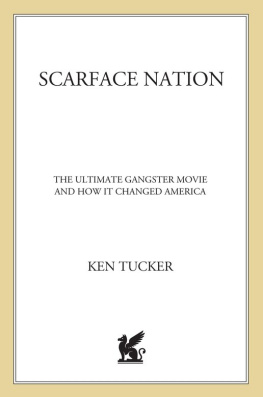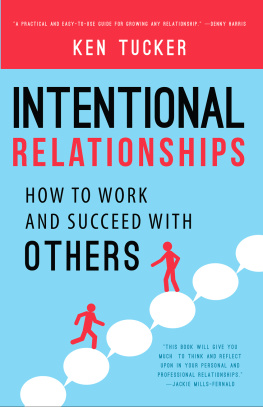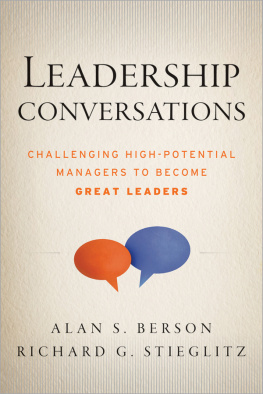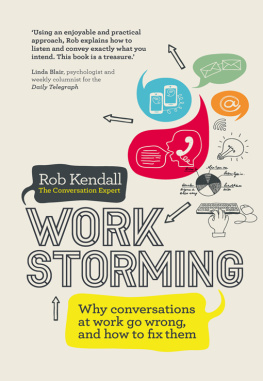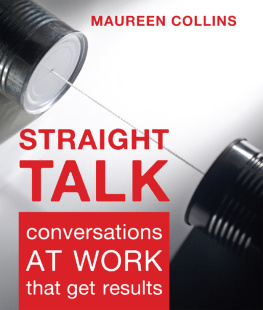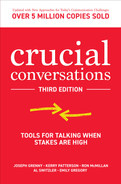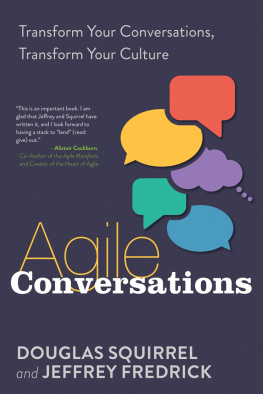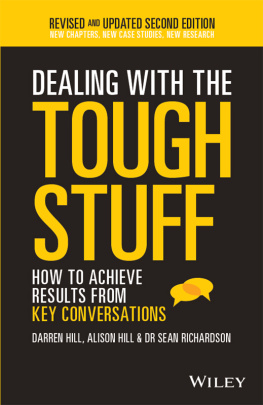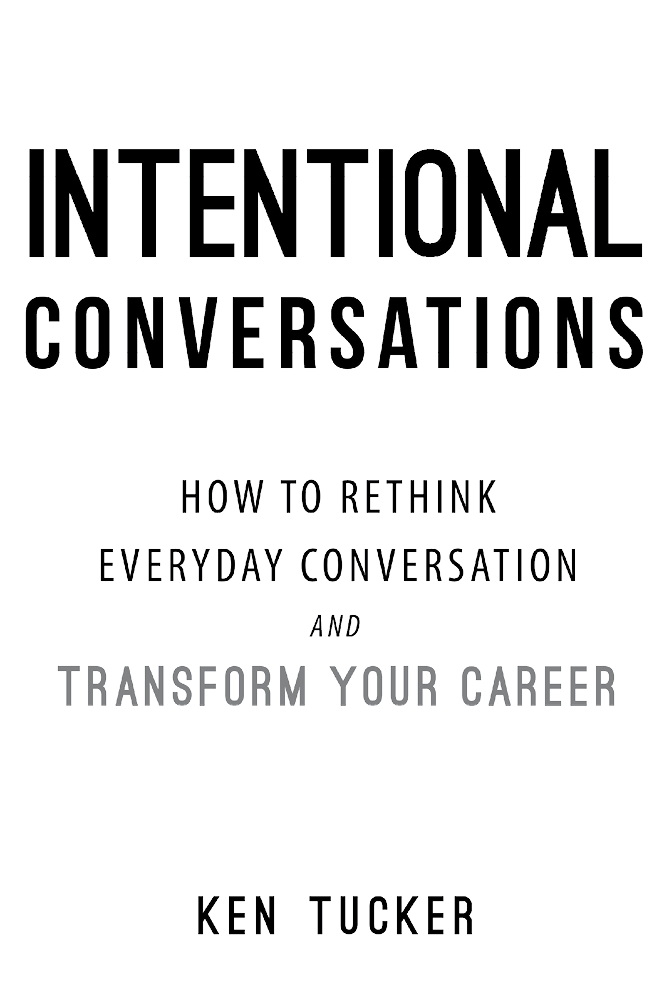For my children, Kendra, Kristen, and Kenny; my granddaughter, Madelyn; my grandson, James Montgomery; my daughter-in-law, Lizzy; and my son-in-law, Tony:
you are my impetus for rethinking conversation.
Acknowledgments
The input and wisdom of many important individuals are contained in this book. Bob Lacy, Jason Majesky, Jill Kamp Melton, Todd Hahn, Florence Hamm, Candice Whisenant, Jenny Rain, and Marianna Marko offered crucial feedback and clarifying suggestions on numerous occasions. My TAG partners, Joe Jurkowski, Jim Osterhaus, Kurt Andre, Mike Marino, and Kevin Ford, added the illustrative stories and examples that give life to the SECRET. Kelsey Cummings, my editor, insisted that each line and paragraph clearly communicate the lesson, logic, and power of an intentional conversation.
My wife, Judy, gave up many hours of personal and family time to discuss, interrogate, and fine-tune my embryonic ideas, unclear examples, incomplete concepts, and rambling stories.
Thousands of clients, others at TAG Consulting, and my friends have all contributed, through their conversations, many of the insights that are captured in this book. Thank you all of you . Thank you for allowing me to be a student with you in the school of life as we continue to learn alongside each other how to get better and better at having intentional conversations.
Foreword
As is likely the case with most readers of Intentional Conversations , I dont remember my first conversation. In fact, I can barely remember several I had yesterday. The reason for that is simplethose easily forgettable conversations werent intentional.
It doesnt have to be the case, however. I know I can improve because Ive had a much better example, but like any worthwhile endeavor, it takes focus and effort.
As a not-so-young adult, I decided to change careers, leave the world of finance, and become a technology entrepreneur. I had no idea what I was doing. But I had an advantage that wasnt obvious at the time: my dad. He didnt know much about business or technology, either. But that didnt really matter. He is a gifted teacher, an effective communicator, and most importantly, knew how to ask the right question and follow it up with an intentional conversation. He combined that with an unwavering faith in his students ability to solve their own problems if they ask and answer the right questions.
Recalling those memorable conversations with my dad wasnt difficult, even years later, not because I can remember the specific problem or question, but because I remember the feeling I usually left with. I felt encouraged to relax artificial, self-imposed constraints; empowered to take action; capableI could do it; and supportedwe were in it together.
Ken Tuckers Intentional Conversations is a fresh and positive reminder of the power of going beyond shooting the breeze and using conversation to get to the heart of work and lifelearning whats in other peoples hearts. So go ahead, ask a question, and start a conversation. One of my favorite intentional conversation starters is, Are we missing anything? Im always amazed at what I learn.
Jeffrey S. Hussey
Advisor, Fluid Capital, LLC and NetBooks, Inc.
Co-Founder and former CEO, F5 Networks
Chapter One
Think, Talk, Grow
W hat is a significant first that you have had? What stands out for you? There are many significant first events that we experience as we are growing up. Some of them we remember with a sense of nostalgia. Others we recall with a smile. Still others we try not to remember. Some remain in our minds more clearly than others, like my first day of kindergarten, for example. I remember that day quite well. It started with my father dropping me off and placing me in the care of Ms. Thompson at the church-school around the corner from our house. As Ms. Thompson, my teacher, was busy receiving other students, I decided that I did not want to be at school. So I quietly left the school and proceeded toward home. But I knew better than to go home, so I hid between the neighbors fence and my house. With my five-year-old brain, I thought I had my plan all figured out. Of course, I didnt; I was hiding in plain sight of the neighbor. The neighbor, Mrs. Taylor, called my father and told him where to find me. This first event, as you can imagine, was a painful one for me.
There are other firsts outside of the school realm that we remember as well. There is our first sweetheart, our first kiss, our first love. There is also our first bank account, first car, and first mortgage. For some of us, there is the birth of our first child, the first child off to college, the first child getting married, and the first grandchild. All of these firsts signal a stage of development, a level of growth. There is, however, one very significant first that happens that all of us experience, but few of us remember.
We all have a first conversation.
There is that specific day and time, that moment, that first instance when, as a child, we put together the thoughts, ideas, or information that launch us into a conversation with another person. It is a monumental event that few people, if any, remember at all. When was your first conversation? What was it about? Who was it with? What was the outcome? Sadly, like me, you probably cannot recall that momentous first conversation. It happened, you know it did, and it does not matter whether the conversation showed your brilliance, levity, innocence, simplicity, or hilarityit is lost and gone forever.
Just think about it: for each of us, there was a time when conversation was a brand-new behavior. It may have been decades ago when, as a novice at conversation, you began logging your first few minutes of dialogue with another person. Since then, you have engaged in hundreds of thousands of conversations. By now, you are a veteran at all types of conversations. At this point in your life, you have had conversations that worked for you and ones that worked against you. You have had conversations that brought you joy and ones that caused you pain. You have had conversations that have changed your life or changed the lives of others. The fact is, once you had that initial conversation, conversation became an integral part of every important event in your life. That is why I believe that conversation is something that we ought to think about far more often than we do.
Think about conversation that is the first purpose of this book. As you read, think about what happens to you, through you, and between you and others because of conversation.
Rethink everyday conversation that is the second purpose of this book. By the end of this book, you will recognize and realize the power conversation has to transform your career and relationships. Conversation sets us apart from all other animals. The use of spoken words to exchange ideas, thoughts, and information is a uniquely human ability. That is not to say animals do not communicate. They do. For instance, they use sound, body language, reaction, and a variety of other means to communicate alarm. Science has shown that all animals communicate. But humans alone have the capacity to have a conversationto think and put those thoughts into words.
Conversation is so natural to us; we do it all the time without much thoughtlike when we pass someone in the hallway and exchange brief greetings then quickly forget that we ever had such an exchange. The exchange of ideas, thoughts, and information between people is an occasion that provides crucial and powerful opportunities that are often overlooked and undervalued.

